Iran's six presidential candidates debated the country's economic problems in a four-hour live debate broadcast on state television.
TEHRAN, Iran — Six presidential candidates debated Iran's economic problems in a four-hour live debate on state television Monday ahead of the June 28 presidential election following last month's helicopter crash that killed President Ebrahim Raisi and seven others.
It was the first of five debates scheduled with 10 days left until a condensed vote in the race to decide who would succeed Raisi, an 85-year-old cleric and a hardline protege of Supreme Leader Ayatollah Ali Khamenei, who was once floated as a possible successor.
The candidates were scheduled to discuss proposals and plans for Iran's deteriorating economy, which is suffering under sanctions imposed by the United States and other Western countries.
The candidates all pledged to work to lift sanctions and introduce reforms but did not provide details. They also discussed inflation, the budget deficit, Iran's housing problem and measures to combat corruption.
The June 28 election comes at a time of rising tensions between Iran and the West over Iran's burgeoning nuclear program, arms supplies to Russia for the Ukraine war and a widespread crackdown on dissent.
Meanwhile, Iran's support for militia proxy forces across the Middle East has come into increased focus as Iranian-backed Houthi rebels in Yemen attack shipping in the Red Sea over Israel's war with Hamas in the Gaza Strip.
Five of the candidates are hard-line, but the sixth, 69-year-old lawmaker Masoud Pezeshkian, a heart surgeon, is supported by some reformists.
The most likely candidate is Mohammed Bagher Qalibaf, 62, a former mayor of Tehran who has close ties to Iran's paramilitary Revolutionary Guards. But many remember Qalibaf, a former IRGC general, for taking part in a violent crackdown on Iranian university students in 1999. He also reportedly ordered live firing on students in 2003 while he was Iran's police chief.
Candidates in the presidential race include Iran's Vice President Amir Hossein Kajizadeh Hashemi, 53, and current Tehran Mayor Ali Reza Zakhani, 58. Also running are Saeed Jalili, 58, a member of the Supreme National Security Council, and Mostafa Pourmohammadi, 64, a cleric who served as interior minister under former President Hassan Rouhani, a relatively moderate.
Qalibaf promised to be a “strong” president who would help the poor, better manage the economy and seek to lift sanctions through diplomatic means.
Pezeshkian called the sanctions a “catastrophe” and also called for easing restrictions on the internet. Iran has long blocked major social media platforms and messaging systems including Facebook, X, Instagram and Telegram, mainly due to security concerns.
All the candidates promised to strengthen Iran's currency, the rial, which has plummeted to 580,000 rials against the dollar. It was worth 32,000 rials to the dollar in 2015 when Iran and world powers agreed to limit Tehran's nuclear program in exchange for lifting sanctions.
The six did not mention the failed nuclear deal. Khamenei has the final say on all major national issues, including nuclear, foreign policy, space and military planning.
Reformist figures such as former President Mohammed Khatami, who negotiated the 2015 nuclear deal, and former Foreign Minister Mohammed Javad Zarif support Pezeshkian, but his support in his constituency in the northwestern city of Tabriz has fallen from 36 percent to 24 percent over the past eight elections.
Raisi won Iran's 2021 presidential election, which saw the lowest voter turnout in Iran's history.

